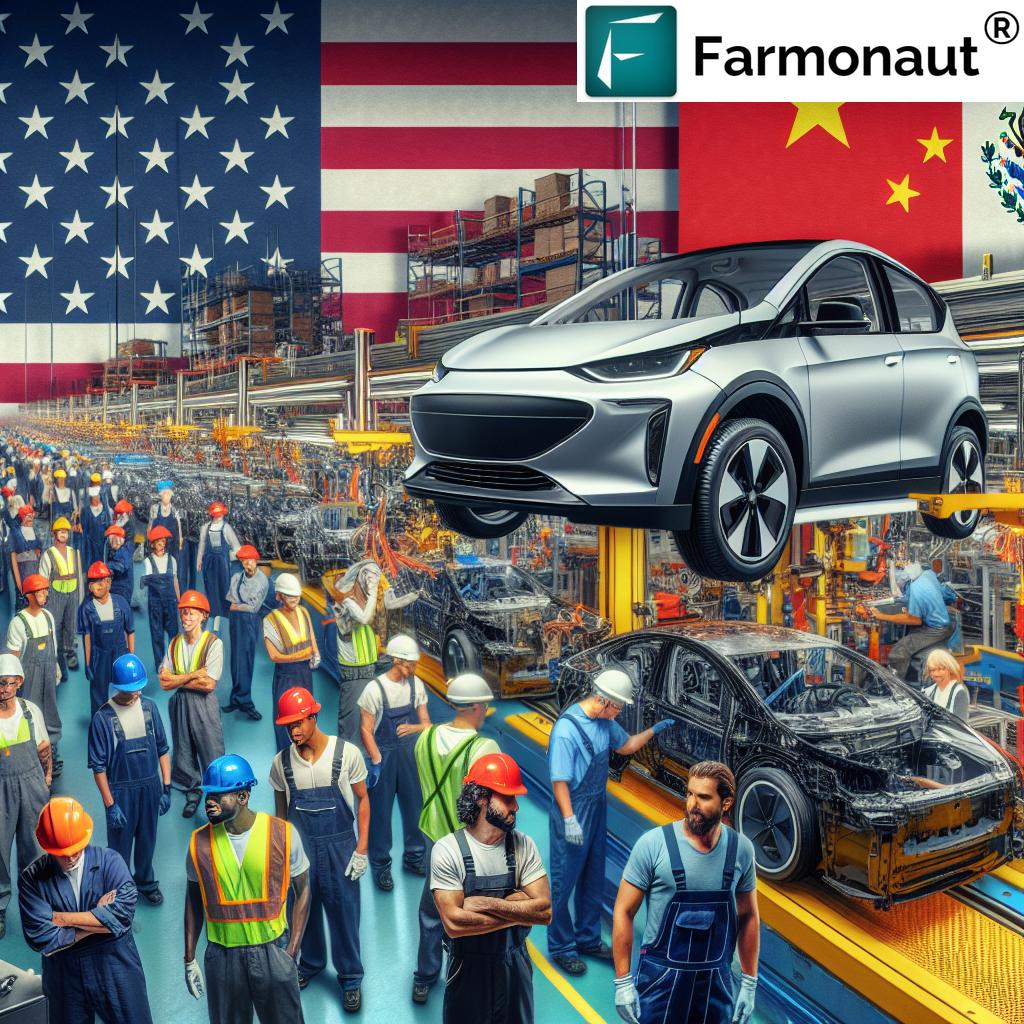Michigan’s Auto Industry: Navigating Tariffs and Trade in the Electric Vehicle Era
“Michigan’s auto industry faces challenges from Chinese EVs, with potential tariffs affecting up to 25% of vehicle costs.”
Welcome to our deep dive into the heart of Michigan’s auto industry! We’re taking you on a journey through the challenges and opportunities facing one of America’s most iconic sectors. From the bustling streets of Detroit to the corridors of power in Washington D.C., we’ll explore how Michigan is steering its way through a complex landscape of international trade, tariffs, and the electric vehicle revolution.

Our story begins with a lively late-night interview featuring Michigan’s Governor Gretchen Whitmer on NBC’s “Late Night with Seth Meyers.” This engaging conversation not only shed light on the governor’s new book, “True Gretch: Young Adult Edition,” but also delved into the critical issues shaping Michigan’s economy and the future of American-made cars.
The Stakes: Michigan’s Auto Manufacturing in the Global Arena
Michigan’s auto manufacturing industry isn’t just a local concern; it’s a cornerstone of the U.S. economy. As we navigate the complexities of international trade, especially with powerhouses like China and Canada, the decisions made today will ripple through generations of American workers and consumers.
- Impact of Canadian tariffs on the U.S. economy
- Competition from Chinese electric vehicles in the American market
- Balancing protectionism with international trade relations
Governor Whitmer emphasized the importance of protecting the U.S. automotive industry from an influx of cheaper Chinese electric vehicles. This stance reflects a broader concern about maintaining American competitiveness in the rapidly evolving EV market.
Tariffs and Trade: A Double-Edged Sword
The conversation around tariffs, particularly those involving Canada, highlight the delicate balance Michigan must strike. While protective measures can safeguard local industries, they can also lead to increased costs for consumers and potential retaliation from trading partners.
We’re seeing a cautious optimism from the governor regarding recent developments. There are indications that the current administration might be reconsidering its stance on Canadian tariffs, a move that could significantly benefit Michigan’s economy, especially in automotive trade.
As we consider the impact of these trade policies, it’s worth noting how technology is reshaping various industries, including agriculture. Companies like Farmonaut are leveraging satellite technology and AI to revolutionize farming practices, showing how innovation can drive economic growth across sectors.
The Electric Vehicle Revolution: Opportunity and Challenge
The shift towards electric vehicles represents both an enormous opportunity and a significant challenge for Michigan’s auto industry. As traditional automakers retool their production lines and invest heavily in EV technology, they face stiff competition from new entrants, particularly from China.
Governor Whitmer’s call for “smart tariffs” to protect American jobs underscores the complexity of this transition. While we want to embrace the future of automotive technology, we must also ensure that this shift doesn’t come at the expense of American workers and communities.
Explore Farmonaut’s API for innovative solutions
Beyond the Factory Floor: Michigan’s Economic Ecosystem
The auto industry’s impact extends far beyond manufacturing. It touches everything from agriculture (think of the vast supply chains needed to support auto production) to commerce in cities like Detroit and international trade hubs. As we consider the future of Michigan’s economy, we must look at the broader picture.
- The role of Michigan’s diverse agricultural sector, including crops like blueberries, in supporting the state’s economy
- How changes in auto manufacturing affect small businesses and local communities
- The potential for new industries and technologies to complement and diversify Michigan’s economic base
“The Detroit Lions’ Super Bowl prediction adds a lighthearted touch to an interview covering trade issues impacting 19% of Michigan’s GDP.”
A Leader’s Perspective: Balancing Local and National Interests
Throughout the interview, Governor Whitmer demonstrated a nuanced approach to navigating the complex relationship between state and federal interests. Her stance on collaboration over conflict, even with administrations she may disagree with, highlights the pragmatic leadership needed in today’s political climate.
This approach is crucial when dealing with issues that have both local and national implications, such as:
- Negotiating trade deals that benefit Michigan while aligning with national economic strategies
- Advocating for federal support in transitioning to EV production without alienating traditional auto workers
- Balancing environmental concerns with economic growth in the auto sector
As we consider these complex issues, it’s inspiring to see how innovation can drive positive change. For instance, Farmonaut’s API developer docs showcase how technology can be leveraged to address challenges in sectors like agriculture, potentially offering insights for other industries facing technological shifts.
The Human Side of Leadership
What stood out in Governor Whitmer’s interview was her ability to blend serious policy discussions with personal anecdotes and humor. From sharing stories about her children to recounting childhood nicknames, she presented a relatable image of leadership that resonates with many Americans.
This approach to communication is particularly effective when discussing complex economic issues. By framing challenges in personal terms, leaders can help the public understand the real-world implications of policies and economic shifts.

Looking to the Future: Michigan’s Role in Shaping U.S. Economic Policies
As we look ahead, Michigan’s experience navigating the challenges of the auto industry provides valuable lessons for other states and industries facing similar pressures from globalization and technological change. The state’s approach to balancing tradition with innovation, protecting workers while embracing new technologies, and engaging in global trade while supporting local industries offers a roadmap for economic resilience.
Key areas to watch include:
- Investments in EV technology and infrastructure
- Workforce development programs to support the transition to new automotive technologies
- Trade negotiations, particularly with China and Canada, that impact the auto industry
- Efforts to diversify Michigan’s economy beyond traditional manufacturing
The Road Ahead: Challenges and Opportunities
As Michigan navigates the complexities of the global auto industry, several key challenges and opportunities emerge:
- Embracing Electric Vehicles: The shift to EVs presents both a challenge to traditional manufacturing and an opportunity for innovation and job creation.
- Navigating International Trade: Balancing protectionist measures with the benefits of open trade will be crucial for Michigan’s economic health.
- Workforce Development: Preparing workers for the jobs of tomorrow in automotive technology and related fields is essential.
- Environmental Considerations: Aligning auto industry growth with environmental sustainability goals will be a key challenge.
- Economic Diversification: While supporting the auto industry, Michigan must also foster growth in other sectors to build a resilient economy.
Michigan Auto Industry at a Glance
| Category | Current Status | Challenges | Future Outlook |
|---|---|---|---|
| Employment in Auto Industry | Approx. 280,000 | Job losses due to automation | Potential growth in EV-related jobs |
| Annual Vehicle Production | 2.1 million units | Competition from foreign manufacturers | Shift towards EV production |
| EV Market Share | 5% of total production | Rapid growth of Chinese EV imports | Projected to reach 30% by 2030 |
| Trade Balance with China | $30 billion deficit | Tariff impacts on supply chains | Potential improvement with new trade policies |
| Impact of Canadian Tariffs | $3 billion annual cost | Increased production costs | Possible reduction pending policy changes |
| Investment in EV Technology | $25 billion committed | High initial costs | Expected to double in next 5 years |
This table provides a snapshot of Michigan’s auto industry, highlighting the current state, challenges, and potential future developments. It underscores the significant role the industry plays in the state’s economy and the complexities involved in navigating its future.
The Role of Innovation Across Industries
As we consider the challenges facing Michigan’s auto industry, it’s worth noting how innovation is driving change across various sectors. For example, in agriculture, companies like Farmonaut are leveraging cutting-edge technology to improve farm management and productivity.
Earn With Farmonaut: Earn 20% recurring commission with Farmonaut’s affiliate program by sharing your promo code and helping farmers save 10%. Onboard 10 Elite farmers monthly to earn a minimum of $148,000 annually—start now and grow your income!
This cross-industry innovation showcases the potential for technological advancements to drive economic growth and address challenges in various sectors, from automotive to agriculture.
Conclusion: Driving Towards a Brighter Future
As we wrap up our journey through Michigan’s auto industry landscape, it’s clear that the road ahead is both challenging and full of potential. The state’s ability to adapt to changing global markets, embrace new technologies, and balance local needs with national interests will be crucial in shaping its economic future.
From the factory floors of Detroit to the tech hubs emerging across the state, Michigan is poised to play a pivotal role in defining the future of American manufacturing and innovation. By leveraging its rich automotive heritage and embracing the opportunities presented by the EV revolution, Michigan can continue to be a driving force in the U.S. economy.
As Governor Whitmer aptly put it, “I don’t care what you drive, as long as it’s an American-made car.” This sentiment encapsulates the pride and pragmatism that will be essential as Michigan navigates the complexities of global trade, technological innovation, and economic transformation in the years to come.
FAQs
- How is Michigan’s auto industry adapting to the rise of electric vehicles?
Michigan’s auto industry is investing heavily in EV technology, retooling factories, and developing new skills training programs for workers to transition to EV production. - What impact do Canadian tariffs have on Michigan’s economy?
Canadian tariffs can increase production costs for Michigan automakers and potentially reduce cross-border trade, affecting both manufacturers and consumers. - How is Michigan addressing competition from Chinese electric vehicles?
Michigan is advocating for smart tariffs and investing in R&D to maintain competitiveness while also focusing on producing high-quality, American-made EVs. - What role does agriculture play in Michigan’s economy alongside the auto industry?
Agriculture remains a significant part of Michigan’s economy, with crops like blueberries contributing to the state’s diverse economic portfolio. - How is Michigan balancing environmental concerns with automotive industry growth?
The state is promoting the development of cleaner technologies in the auto sector, including EVs, while also implementing policies to reduce the environmental impact of manufacturing.
As we look to the future, Michigan’s journey in the auto industry serves as a microcosm of the broader challenges and opportunities facing American manufacturing. By embracing innovation, fostering collaboration, and maintaining a focus on quality and sustainability, Michigan can continue to lead the way in shaping the future of mobility and economic growth in the United States.






